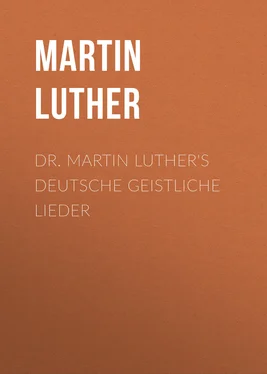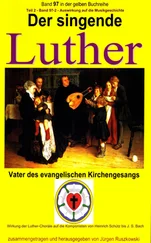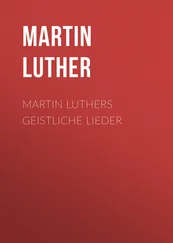Martin Luther - Dr. Martin Luther's Deutsche Geistliche Lieder
Здесь есть возможность читать онлайн «Martin Luther - Dr. Martin Luther's Deutsche Geistliche Lieder» — ознакомительный отрывок электронной книги совершенно бесплатно, а после прочтения отрывка купить полную версию. В некоторых случаях можно слушать аудио, скачать через торрент в формате fb2 и присутствует краткое содержание. Издательство: Иностранный паблик, Жанр: foreign_prose, foreign_religion, Философия, foreign_psychology, foreign_antique, на немецком языке. Описание произведения, (предисловие) а так же отзывы посетителей доступны на портале библиотеки ЛибКат.
- Название:Dr. Martin Luther's Deutsche Geistliche Lieder
- Автор:
- Издательство:Иностранный паблик
- Жанр:
- Год:неизвестен
- ISBN:нет данных
- Рейтинг книги:4 / 5. Голосов: 1
-
Избранное:Добавить в избранное
- Отзывы:
-
Ваша оценка:
- 80
- 1
- 2
- 3
- 4
- 5
Dr. Martin Luther's Deutsche Geistliche Lieder: краткое содержание, описание и аннотация
Предлагаем к чтению аннотацию, описание, краткое содержание или предисловие (зависит от того, что написал сам автор книги «Dr. Martin Luther's Deutsche Geistliche Lieder»). Если вы не нашли необходимую информацию о книге — напишите в комментариях, мы постараемся отыскать её.
Dr. Martin Luther's Deutsche Geistliche Lieder — читать онлайн ознакомительный отрывок
Ниже представлен текст книги, разбитый по страницам. Система сохранения места последней прочитанной страницы, позволяет с удобством читать онлайн бесплатно книгу «Dr. Martin Luther's Deutsche Geistliche Lieder», без необходимости каждый раз заново искать на чём Вы остановились. Поставьте закладку, и сможете в любой момент перейти на страницу, на которой закончили чтение.
Интервал:
Закладка:
In a very different style of language, but in a like strain of eulogy, writes Dr. Merle d'Aubigne, in the third volume of his History of the Reformation: "The church was no longer composed of priests and monks; it was now the congregation of believers. All were to take part in worship, and the chanting of the clergy was to be succeeded by the psalmody of the people. Luther, accordingly, in translating the psalms, thought of adapting them to be sung by the church. Thus a taste for music was diffused throughout the nation. From Luther's time, the people sang; the Bible inspired their songs. Poetry received the same impulse. In celebrating the praises of God, the people could not confine themselves to mere translations of ancient anthems. The souls of Luther and of several of his contemporaries, elevated by their faith to thoughts the most sublime, excited to enthusiasm by the struggles and dangers by which the church at its birth was unceasingly threatened, inspired by the poetic genius of the Old Testament and by the faith of the New, ere long gave vent to their feelings in hymns, in which all that is most heavenly in poetry and music was combined and blended. Hence the revival, in the sixteenth century, of hymns such as in the first century used to cheer the martyrs in their sufferings. We have seen Luther, in 1523, employing it to celebrate the martyrs at Brussels; other children of the Reformation followed his footsteps; hymns were multiplied; they spread rapidly among the people, and powerfully contributed to rouse it from sleep."
It is not difficult to come approximately at the order of composition of Luther's hymns. The earliest hymn-book of the Reformation – if not the earliest of all printed hymn-books – was published at Wittenberg in 1524, and contained eight hymns, four of them from the pen of Luther himself; of the other four not less than three were by Paul Speratus, and one of these three, the hymn Es ist das Heil , which caused Luther such delight when sung beneath his window by a wanderer from Prussia. 4 4 Merle d'Aubigne, History of the Reformation, Vol. III.
Three of Luther's contributions to this little book were versions of Psalms – the xii, xiv, and cxxx – and the fourth was that touching utterance of personal religious experience, Nun fruet euch, lieben Christen g'mein . But the critics can hardly be mistaken in assigning as early a date to the ballad of the Martyrs of Brussels. Their martyrdom took place July 1, 1523, and the " New Song " must have been inspired by the story as it was first brought to Wittenberg, although it is not found in print until the Enchiridion , which followed the Eight Hymns , later in the same year, from the press of Erfurt, and contained fourteen of Luther's hymns beside the four already published.
In the hymn-book published in 1525 by the composer Walter, Luther's friend, were six more of the Luther hymns. And in 1526 appeared the "German Mass and Order of Divine Service," containing "the German Sanctus," a versification of Isaiah vi. Of the remaining eleven, six appeared first in the successive editions of Joseph Klug's hymn-book, Wittenberg, 1535 and 1543.It is appropriate to the commemorative character of the present edition that in it the hymns should be disposed in chronological order.
The TUNES which are here printed with the hymns of Luther are of those which were set to them during his lifetime. Some of them, like the hymns to which they were set, are derived from the more ancient hymnody of the German and Latin churches. Others, as the tunes Vom Himmel hoch, Ach Gott vom Himmel , and Christ unser Herr zum Jordan kam , are conjectured to have been originally secular airs. But that many of the tunes that appeared simultaneously and in connection with Luther's hymns were original with Luther himself, there seems no good reason to doubt. Luther's singular delight and proficiency in music are certified by a hundred contemporary testimonies. His enthusiasm for it overflows in his Letters and his Table Talk. He loved to surround himself with accomplished musicians, with whom he would practise the intricate motets of the masters of that age; and his critical remarks on their several styles are on record. At least one autograph document proves him to have been a composer of melodies to his own words: one may see, appended to von Winterfeld's fine quarto edition of Luther's hymns (Leipzig, 1840) a fac-simile of the original draft of Vater Unser , with a melody sketched upon a staff of five lines, and then cancelled, evidently by hand practised in musical notation. But perhaps the most direct testimony to his actual work as a composer is found in a letter from the composer John Walter, capellmeister to the Elector of Saxony, written in his old age for the express purpose of embodying his reminiscences of his illustrious friend as a church-musician.
"It is to my certain knowledge," writes Walter, "that that holy man of God, Luther, prophet and apostle to the German nation, took great delight in music, both in choral and in figural composition. With whom I have passed many a delightful hour in singing; and oftentimes have seen the dear man wax so happy and merry in heart over the singing as that it was well-nigh impossible to weary or content him therewithal. And his discourse concerning music was most noble.
"Some forty years ago, when he would set up the German Mass at Wittenberg, he wrote to the Elector of Saxony and Duke Johannsen, of illustrious memory, begging to invite to Wittenberg the old musician Conrad Rupff and myself, to consult with him as to the character and the proper notation of the Eight Tones; and he finally himself decided to appropriate the Eighth Tone to the Epistle and the Sixth Tone to the Gospel, speaking on this wise: Our Lord Christ is a good Friend, and his words are full of love; so we will take the Sixth Tone for the Gospel. And since Saint Paul is a very earnest apostle we will set the Eighth Tone to the Epistle. So he himself made the notes over the Epistles, and the Gospels, and the Words of Institution of the true Body and Blood of Christ, and sung them over to me to get my judgment thereon. He kept me three weeks long at Wittenberg, to write out the notes over some of the Gospels and Epistles, until the first German Mass was sung in the parish church. And I must needs stay to hear it, and take with me a copy of the Mass to Torgau and present it to His Grace the Elector from Doctor Luther.
"Furthermore, he gave orders to re-establish the Vespers, which in many places were fallen into disuse, with short plain choral hymns for the students and boys; withal, that the charity-scholars, collecting their bread, should sing from door to door Latin Hymns, Anthems and Responses, appropriate to the season. It was no satisfaction to him that the scholars should sing in the streets nothing but German songs….The most profitable songs for the common multitude are the plain psalms and hymns, both Luther's and the earlier ones; but the Latin songs are useful for the learned and for students. We see, and hear, and clearly apprehend how the Holy Ghost himself wrought not only in the authors of the Latin hymns, but also in Luther, who in our time has had the chief part both in writing the German choral hymns, and in setting them to tunes; as may be seen, among others in the German Sanctus ( Jesaia dem Propheten das geschah ) how masterly and well he has fitted all the notes to the text, according to the just accent and concent. At the time, I was moved by His Grace to put the question how or where he had got this composition, or this instruction; whereupon the dear man laughed at my simplicity, and said: I learned this of the poet Virgil, who has the power so artfully to adapt his verses and his words to the story he is telling; in like manner must Music govern all its notes and melodies by the text." 5 5 This interesting and characteristic document was printed first in the Syntagma Musicum of Michael Praetorius, many of whose harmonies are to be found in this volume. It has been repeatedly copied since. I take it from Rambach, "Ueber D. Martin Luthers Verdienst um den Kirchengesang, oder Darstellung desjenigen was er als Liturg, als Liederdichter und Tonsetzer zur Verbesserung des oeffentlichen Gottesdienstes geleistet hat. Hamburg, 1813."
Интервал:
Закладка:
Похожие книги на «Dr. Martin Luther's Deutsche Geistliche Lieder»
Представляем Вашему вниманию похожие книги на «Dr. Martin Luther's Deutsche Geistliche Lieder» списком для выбора. Мы отобрали схожую по названию и смыслу литературу в надежде предоставить читателям больше вариантов отыскать новые, интересные, ещё непрочитанные произведения.
Обсуждение, отзывы о книге «Dr. Martin Luther's Deutsche Geistliche Lieder» и просто собственные мнения читателей. Оставьте ваши комментарии, напишите, что Вы думаете о произведении, его смысле или главных героях. Укажите что конкретно понравилось, а что нет, и почему Вы так считаете.












